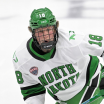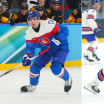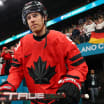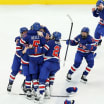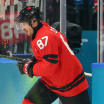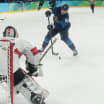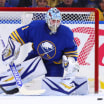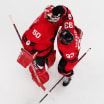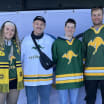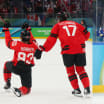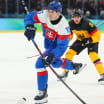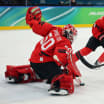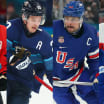It was June 14, 2011, a week till summer. But for Mark Recchi, winter was coming. He was 43 years old, sharing a bottle of red with Boston Bruins teammate Shawn Thornton at the Westin Bayshore Vancouver, enjoying the view of Stanley Park and Coal Harbour.
The Bruins were playing the Vancouver Canucks in Game 7 of the Stanley Cup Final the next day. Recchi told Thornton it would be his last game.
Recchi stood tall on way to Hockey Hall of Fame
Undersized forward won Stanley Cups three times, played 1,652 career NHL games
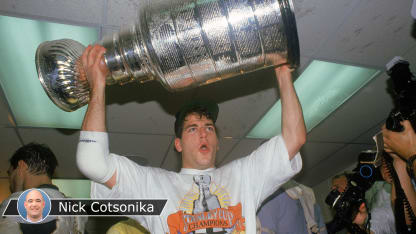
"I knew we were going to win," Recchi said. "I just … I just … I really believed we were in a great place as a team and really felt we were going to win. That was going to be it."
The rest of the Bruins played like it was their last game too.
"I'm sure everyone would have blocked a shot with their face, not that you wouldn't in the Stanley Cup Final as it is, but it gave that extra little …" Thornton said, his voice trailing off. "Everyone loved him so much that knowing it was his last game, everyone was going to do whatever it took."
When Brad Marchand scored into an empty net with 2:44 left to make it 4-0, Recchi's eyes watered. Coach Claude Julien told him he'd be out the last shift. Recchi gathered himself, and the right wing from Kamloops, British Columbia, had the storybook ending in his home province. With five seconds left, Recchi lifted his arms. After Bruins captain Zdeno Chara took a victory lap, Recchi raised the Cup.
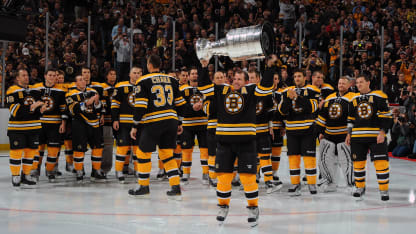
© Steve Babineau/Getty Images
Recchi will be inducted into the Hockey Hall of Fame on Monday with Dave Andreychuk, Clare Drake, Danielle Goyette, Jeremy Jacobs, Paul Kariya and Teemu Selanne.
More than 7,600 men have played in the NHL in its 100 years. Recchi ranks fifth in games played (1,652), 12th in points (1,533), 15th in assists (956) and 20th in goals (577). He had 147 points (61 goals, 86 assists) in 189 Stanley Cup Playoff games and won three rings, with the 1990-91 Pittsburgh Penguins, 2005-06 Carolina Hurricanes and 2010-11 Bruins.
"I couldn't have asked for anything more," said Recchi, an assistant with the Penguins. "I never could imagine playing as long as I did. I thought if I could play five years, I was going to be happy. I really wasn't supposed to make it."
* * * * *
Recchi is listed at 5 foot 10. That stretches the truth.
"I think I was, like, 5-9 and three quarters at one point, but I was never 5-10," Recchi said. "Nope."
Didn't matter.
"They always said he was too small," said his father, Mel. "They said he'd never make juniors because he was too small, and then when he was in junior, they said, no, he'd never make it up in the pros because he was too small. But he had that great hockey sense and great work ethic."
Recchi grew up playing street hockey with neighborhood kids despite the slant of Douglas Street, chasing the puck if it rolled downhill. He was a natural athlete -- good at baseball, basketball, soccer and track too -- and learned a defining lesson.
"In minor hockey, as you know, it's all volunteer people and fathers coming out at six in the morning to coach kids," his father said. "I said, 'You give it all you've got every time you go out on the ice, and play hard and play honestly.' "
In peewee, Recchi's team defeated a prestigious club from Vancouver for the provincial championship. He was a little guy in glasses. His father said he scored two or three goals, and a father from the other team shook his head in disbelief.
When he was 15 or 16, Recchi skated with the Kamloops Junior Oilers of the Western Hockey League and held his own. The guys encouraged him. He thought he might have a chance.
He had 154 points (61 goals, 93 assists) for Kamloops Blazers of the WHL in 1987-88, and the Penguins took him in the 1988 NHL Draft … in the fourth round (No. 67).
Recchi had 99 points (50 goals, 49 assists) in 63 games for Muskegon of the International Hockey League in 1988-89, plus 21 points (seven goals, 14 assists) in 14 playoff games as Muskegon won the Turner Cup. But he got called up for 15 games with the Penguins and had two points (one goal, one assist).
The breakthrough came in 1989-90. After 11 points (seven goals, four assists) in the IHL, he got called up to the NHL and had 67 points (30 goals, 37 assists) in 74 games for the Penguins. He had 113 points (40 goals, 73 points) in 78 games in 1990-91, plus 34 points (10 goals, 24 assists) in 24 playoff games as the Penguins won the Cup.
In Game 6 of the Wales Conference Final against the Bruins in Pittsburgh, Recchi scored with 4:20 left to make it 4-3. Mario Lemieux scored an empty-netter with 28 seconds left. The Penguins won the game 5-3 and the series 4-2 and headed to their first Final. Coach "Badger" Bob Johnson found Recchi on the ice, grabbed his cheeks and squeezed.
"That always jumps out at me," Recchi said. "It was a pretty special moment."
* * * * *
Recchi went on to play for the Philadelphia Flyers, Montreal Canadiens, Flyers again, Penguins again, Hurricanes, Penguins again, Atlanta Thrashers, Tampa Bay Lightning and Bruins. He lasted so long the same way he made it in the first place, while becoming a complete player, mentoring young players and accepting lesser roles in later years. His last chapters say a lot about his love for the game, and the game's love for him.
The Hurricanes acquired him from the Penguins on March 9, 2006. He was a final piece of a championship team at age 38, with 16 points (seven goals, nine assists) in 25 playoff games, including six points (two goals, four assists) in the seven-game Final against the Edmonton Oilers.
He signed with the Penguins, housed 18-year-old rookie Jordan Staal and had 68 points (24 goals, 44 assists) in 82 games in 2006-07. He struggled early the following season. The Penguins waived him and assigned him to Wilkes-Barre/Scranton of the American Hockey League. But the Thrashers claimed him on reentry waivers Dec. 8, 2007.
At 39, about to turn 40 on Feb. 1, he had hard conversations with his father and close friends. They confirmed what he thought: He could still play. He had 40 points (12 goals, 28 assists) in 53 games the rest of the season, second on the team to Ilya Kovalchuk in that span.
He signed with the Lightning and struggled early in 2008-09. But after friend and former teammate Rick Tocchet took over as coach, they shared some red and talked. Tocchet reassured Recchi again: He could still play.
"He was low, but I could see the fight in him," Tocchet said.
Recchi scored 45 points (13 goals, 32 assists) in 62 games for the Lightning, while he and veteran Gary Roberts looked after rookie Steven Stamkos. They had him over for dinners. He watched them train.
"It was just amazing to see the enthusiasm he still had, to be that difference-maker that he was, even at that age," Stamkos said. "He was definitely someone that I looked up to as an 18-year-old kid."
The Lightning traded Recchi to the Bruins on March 4, 2009. He played the rest of that season and two more, a final piece of another championship team. Why would guys, as Thornton said, block shots with their faces for him? Why did everyone love him so much?
In the 2009 Eastern Conference First Round, he had a kidney stone. He threw up in pain before a game, then scored the first goal. He had five points (three goals, two assists) in the seven-game series.
In the 2011 playoffs, he played on a line with Marchand and Patrice Bergeron. On the power play, he didn't play the point or half wall, like he used to. He played net-front, with Chara blasting from the point, opponents cross-checking from behind. He had seven points (three goals, four assists) against the Canucks and became the oldest player to score in the Final.
"He used to tell me, 'When I was younger, I used to legit be able to put a team on my back, and I could give us a shot at winning,' " Thornton said. "He's like, 'Obviously I don't have that anymore, but I'm going to give everything I have.' He was, 'Put me wherever you need me to give our team the most success. Whatever I need to do. If I need to sew the socks after the game.'
"He was always about whatever it takes to win, not what's best for Rex. That's why he's a champion and going to the Hall of Fame."

